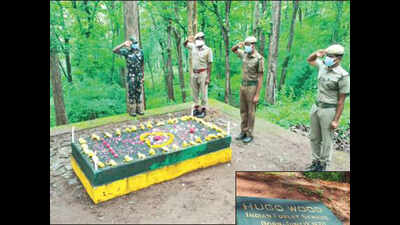- News
- City News
- coimbatore News
- Officer who stood up to the British for teakwood forests
Trending
This story is from June 15, 2021
Officer who stood up to the British for teakwood forests
When Hugo Francis Andrew Wood was posted in the hills surrounding Coimbatore in the 1900s, he used to wear a shirt with four pockets containing teakwood seeds and walk with a stick in the reserve forest in Topslip every day. He would sow the seeds in the area and created a teakwood forest in Topslip near Pollachi which had been completely destroyed by British government before Wood’s arrival.

Man of nature: Forest officials paid respects to Hugo Francis Andrew Wood’s grave at Topslip to mark his 151st birth anniversary
When Hugo Francis Andrew Wood was posted in the hills surrounding Coimbatore in the 1900s, he used to wear a shirt with four pockets containing teakwood seeds and walk with a stick in the reserve forest in Topslip every day. He would sow the seeds in the area and created a teakwood forest in Topslip near Pollachi which had been completely destroyed by British government before Wood’s arrival.
His contribution is remembered till now.And so to mark the 151st birthday of the British forest officer, forest officials paid their respects to Wood’s grave at Topslip in Coimbatore on Saturday. Frontline staff from the Topslip forest range decorated the cemetery with flowers and saluted to the late British forest officer Hugo Wood.
Born on June 12, 1870 to Scottish parents in Bombay presidency. After joining the imperial forest service (IFS) in 1890, received his professional training at Royal Indian Engineering College at Cooper’s Hill, came to India during 1893. He worked in Madras Presidency up to his retirement in 1926, holding various positions such as the assistant conservator of forests, deputy conservator of forests and later the conservator of forests in 1918.
Before the British arrived, many rosewood and teakwood trees were found in Anaimalai reserve forest in Coimbatore district. The British axed them down and sent it to the Bombay to construct ships for the British Royal Army. The entire forest in Anaimalai was destroyed by the British between 1800 and 1900. The Mount Stuart Tramway was used to transport timber from Topslip through Parambikulam.
S Ramasubramanian, conservator of forests, Thanjavur circle, told TOI that without Hugo Wood, the dense forest that the Anaimalai hills boasts today wouldn’t have been a reality. “Huho Wood’s epitaph read, ‘If you want to see me, look around’. He committed his life for the forest and he died for the forest,” said Ramasubramanian.
Hugo Wood died at the age of 63 in Nilgiris district and his body was buried at Topslip near Pollachi in Coimbatore district.
Email your feedback with name and address to southpole.toi@timesgroup.com
His contribution is remembered till now.And so to mark the 151st birthday of the British forest officer, forest officials paid their respects to Wood’s grave at Topslip in Coimbatore on Saturday. Frontline staff from the Topslip forest range decorated the cemetery with flowers and saluted to the late British forest officer Hugo Wood.
Born on June 12, 1870 to Scottish parents in Bombay presidency. After joining the imperial forest service (IFS) in 1890, received his professional training at Royal Indian Engineering College at Cooper’s Hill, came to India during 1893. He worked in Madras Presidency up to his retirement in 1926, holding various positions such as the assistant conservator of forests, deputy conservator of forests and later the conservator of forests in 1918.
Before the British arrived, many rosewood and teakwood trees were found in Anaimalai reserve forest in Coimbatore district. The British axed them down and sent it to the Bombay to construct ships for the British Royal Army. The entire forest in Anaimalai was destroyed by the British between 1800 and 1900. The Mount Stuart Tramway was used to transport timber from Topslip through Parambikulam.
In 1915, Hugo Wood was appointed in Coimbatore district. Appalled by the destruction, he focused on growing teakwood trees in the Anaimalai forest. When the British government approached him to axe trees for construction of ships for World War I, he did not allow it. He worked at Anaimalai till 1919.
S Ramasubramanian, conservator of forests, Thanjavur circle, told TOI that without Hugo Wood, the dense forest that the Anaimalai hills boasts today wouldn’t have been a reality. “Huho Wood’s epitaph read, ‘If you want to see me, look around’. He committed his life for the forest and he died for the forest,” said Ramasubramanian.
Hugo Wood died at the age of 63 in Nilgiris district and his body was buried at Topslip near Pollachi in Coimbatore district.
Email your feedback with name and address to southpole.toi@timesgroup.com
End of Article
FOLLOW US ON SOCIAL MEDIA










